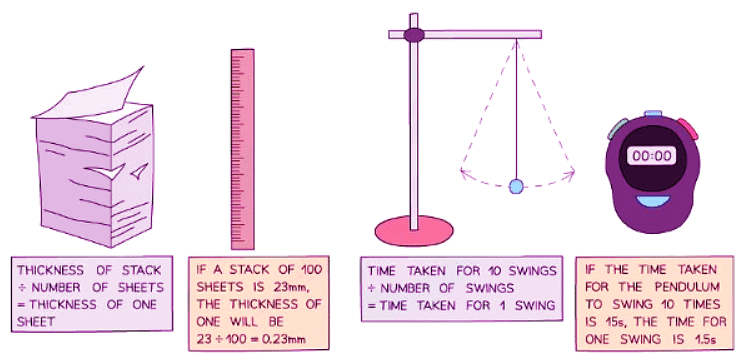Year 11 Exam > Year 11 Notes > Physics for GCSE/IGCSE > Measurement
Measurement | Physics for GCSE/IGCSE - Year 11 PDF Download
Measuring Length & Volume
- Rulers can measure small distances accurately, typically to the nearest millimeter (mm).
- A ruler can precisely measure small distances to the nearest millimeter.

- A ruler can precisely measure small distances to the nearest millimeter.
- When measuring larger distances (a few meters), a tape measure is suitable, while for even larger distances, a trundle wheel is more appropriate.

- Measuring Cylinders
- Volume Measurement: Measuring cylinders are utilized to measure the volume of liquids accurately.
- Calculating Irregular Shapes: By noting the change in volume, a measuring cylinder can determine the volume of irregular shapes.

Measuring Time
- Stop-clocks and stopwatches serve the purpose of gauging time spans.
- Human reaction time is a crucial consideration in timing intervals.
- The duration of human reaction time can notably affect measurements, particularly in instances where the time spans being measured are extremely brief, such as those shorter than a second.
Question for MeasurementTry yourself: Which measuring tool is suitable for accurately measuring small distances to the nearest millimeter?View Solution
Multiple Readings

- When measuring the thickness of a single sheet of paper, obtaining precise results is challenging due to its minuscule size.
- However, by measuring the thickness of 100 sheets of paper, accuracy improves significantly.
- Dividing the total thickness by 100 yields an accurate measurement for the thickness of one sheet.
- This method, which involves collecting data from numerous measurements and then dividing by the quantity, is effective for obtaining precise values for small measurements.
- Similarly, in determining the time period of a pendulum, one can measure the time for 10 swings and then calculate the average by dividing by 10.
The document Measurement | Physics for GCSE/IGCSE - Year 11 is a part of the Year 11 Course Physics for GCSE/IGCSE.
All you need of Year 11 at this link: Year 11
|
127 videos|148 docs|35 tests
|
FAQs on Measurement - Physics for GCSE/IGCSE - Year 11
| 1. How can length and volume be measured accurately? |  |
Ans. Length can be measured using rulers, tape measures, or calipers, while volume can be measured using graduated cylinders or a measuring cup. It is important to ensure that the measurement tools are properly calibrated for accurate results.
| 2. What is the importance of measuring time accurately? |  |
Ans. Measuring time accurately is crucial for various activities such as scheduling, cooking, and scientific experiments. It helps in maintaining efficiency and precision in daily tasks and ensures that tasks are completed in a timely manner.
| 3. Why is taking multiple readings important in measurements? |  |
Ans. Taking multiple readings helps to minimize errors and increase the accuracy of measurements. By averaging multiple readings, any outliers or inconsistencies can be identified and corrected, leading to more reliable results.
| 4. How can one ensure consistent measurements over time? |  |
Ans. Consistent measurements can be achieved by using the same measurement tools, following standardized procedures, and regularly calibrating the equipment. It is also important to minimize external factors that could affect the measurements, such as temperature or humidity changes.
| 5. What are some common units used for measuring length, volume, and time? |  |
Ans. Common units for measuring length include meters, centimeters, and inches, while volume is often measured in liters, milliliters, or cubic centimeters. Time is typically measured in seconds, minutes, and hours.
Related Searches




















